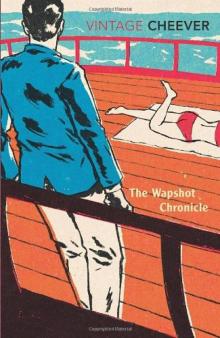- Home
- John Cheever
The Stories of John Cheever
The Stories of John Cheever Read online
The Stories of John Cheever
John Cheever
John Cheever
THE STORIES OF JOHN CHEEVER
CONTENTS
Preface
Goodbye, My Brother
The Common Day
The Enormous Radio
O City of Broken Dreams
The Hartleys
The Sutton Place Story
The Summer Farmer
Torch Song
The Pot of Gold
Clancy in the Tower of Babel
Christmas Is a Sad Season for the Poor
The Season of Divorce
The Chaste Clarissa
The Cure
The Superintendent
The Children
The Sorrows of Gin
O Youth and Beauty!
The Day the Pig Fell into the Well
The Five-Forty-Eight
Just One More Time
The Housebreaker of Shady Hill
The Bus to St. James’s
The Worm in the Apple
The Trouble of Marcie Flint
The Bella Lingua
The Wrysons
The Country Husband
The Duchess
The Scarlet Moving Van
Just Tell Me Who It Was
Brimmer
The Golden Age
The Lowboy
The Music Teacher
A Woman Without a Country
The Death of Justina
Clementina
Boy in Rome
A Miscellany of Characters That Will Not Appear
The Chimera
The Seaside Houses
The Angel of the Bridge
The Brigadier and the Golf Widow
A Vision of the World
Reunion
An Educated American Woman
Metamorphoses
Mene, Mene, Tekel, Upharsin
Montraldo
The Ocean
Marito in Cittŕ
The Geometry of Love
The Swimmer
The World of Apples
Another Story
Percy
The Fourth Alarm
Artemis, the Honest Well Digger
Three Stories
The Jewels of the Cabots
PREFACE
IT WOULD please me if the order in which these stories are published had been reversed and if I appeared first as an elderly man and not as a young one who was truly shocked to discover that genuinely decorous men and women admitted into their affairs erotic bitterness and even greed. The parturition of a writer, I think, unlike that of a painter, does not display any interesting alliances to his masters. In the growth of a writer one finds nothing like the early Jackson Pollock copies of the Sistine Chapel paintings with their interesting cross-references to Thomas Hart Benton. A writer can be seen clumsily learning to walk, to tie his necktie, to make love, and to eat his peas off a fork. He appears much alone and determined to instruct himself. Naďve, provincial in my case, sometimes drunk, sometimes obtuse, almost always clumsy, even a selected display of one’s early work will be a naked history of one’s struggle to receive an education in economics and love.
These stories date from my Honorable Discharge from the Army at the end of World War II. Their order is, to the best of my memory, chronological and the most embarrassingly immature pieces have been dropped. These stories seem at times to be stories of a long-lost world when the city of New York was still filled with a river light, when you heard the Benny Goodman quartets from a radio in the corner stationery store, and when almost everybody wore a hat. Here is the last of that generation of chain smokers who woke the world in the morning with their coughing, who used to get stoned at cocktail parties and perform obsolete dance steps like “the Cleveland Chicken,” sail for Europe on ships, who were truly nostalgic for love and happiness, and whose gods were as ancient as yours and mine, whoever you are. The constants that I look for in this sometimes dated paraphernalia are a love of light and a determination to trace some moral chain of being. Calvin played no part at all in my religious education, but his presence seemed to abide in the barns of my childhood and to have left me with some undue bitterness.
Many of these stories first appeared in The New Yorker, where Harold Ross, Gus Lobrano, and William Maxwell gave me the inestimable gifts of a large, discerning, and responsive group of readers and enough money to feed the family and buy a new suit every other year. “This is a family magazine, God damn it,” Ross used to yell at any hint at the stirring of erotic drives. He was not himself a decorous man, and when he discovered that I would jump whenever he used the word “fuck” across the lunch table he would frequently say “fuck” and watch me jump. His lack of decorum was, in fact, pronounced and if, for example, he anticipated a dull poker companion, he would go into the bathroom and return with his ears stuffed with toilet paper. This sort of behavior would never, of course, appear in the magazine. But he taught one, I like to think, that decorum is a mode of speech, as profound and connotative as any other, differing not in content but in syntax and imagery. Since the men he encouraged ranged as widely as Irwin Shaw and Vladimir Nabokov, he seems to have done more good than anything else.
Any precise documentation of one’s immaturity is embarrassing, and this I find from time to time in the stories, but this embarrassment is redeemed for me by the memories the stories hold for me of the women and men I have loved and the rooms and corridors and beaches where the stories were written. My favorite stories are those that were written in less than a week and that were often composed aloud. I remember exclaiming: “My name is Johnny Hake!” This was in the hallway of a house in Nantucket that we had been able to rent cheaply because of the delayed probating of a will. Coming out of the maid’s room in another rented house I shouted to my wife: “This is a night when kings in golden mail ride their elephants over the mountains!” The forbearance of my family has been inestimable. It was under the canopy of a Fifty-ninth Street apartment house that I wrote, aloud, the closing of “Goodbye, My Brother.”
“Oh, what can you do with a man like that?” I asked, and closed by saying, “I watched the naked women walk out of the sea!”
“You’re talking to yourself, Mr. Cheever,” the doorman said politely, and he toocorrect, friendly, and content with his ten-dollar tip at Christmasseems a figure from the enduring past.
Goodbye, My Brother
We are a family that has always been very close in spirit. Our father was drowned in a sailing accident when we were young, and our mother has always stressed the fact that our familial relationships have a kind of permanence that we will never meet with again. I don’t think about the family much, but when I remember its members and the coast where they lived and the sea salt that I think is in our blood, I am happy to recall that I am a Pommeroythat I have the nose, the coloring, and the promise of longevityand that while we are not a distinguished family, we enjoy the illusion, when we are together, that the Pommeroys are unique. I don’t say any of this because I’m interested in family history or because this sense of uniqueness is deep or important to me but in order to advance the point that we are loyal to one another in spite of our differences, and that any rupture in this loyalty is a source of confusion and pain.
We are four children; there is my sister Diana and the three men Chaddy, Lawrence, and myself. Like most families in which the children are out of their twenties, we have been separated by business, marriage, and war. Helen and I live on Long Island now, with our four children. I teach in a secondary school, and I am past the age where I expect to be made headmasteror principal, as we saybut I respect the work. Chaddy, who has done better than the rest of us, li
ves in Manhattan, with Odette and their children. Mother lives in Philadelphia, and Diana, since her divorce, has been living in France, but she comes back to the States in the summer to spend a month at Laud’s Head. Laud’s Head is a summer place on the shore of one of the Massachusetts islands. We used to have a cottage there, and in the twenties our father built the big house. It stands on a cliff above the sea and, excepting St. Tropez and some of the Apennine villages, it is my favorite place in the world. We each have an equity in the place and we contribute some money to help keep it going.
Our youngest brother, Lawrence, who is a lawyer, got a job with a Cleveland firm after the war, and none of us saw him for four years. When he decided to leave Cleveland and go to work for a firm in Albany, he wrote Mother that he would, between jobs, spend ten days at Laud’s Head, with his wife and their two children. This was when I had planned to take my vacationI had been teaching summer schooland Helen and Chaddy and Odette and Diana were all going to be there, so the family would be together. Lawrence is the member of the family with whom the rest of us have least in common. We have never seen a great deal of him, and I suppose that’s why we still call him Tiftya nickname he was given when he was a child, because when he came down the hall toward the dining room for breakfast, his slippers made a noise that sounded like “Tifty, tifty, tifty.” That’s what Father called him, and so did everyone else. When he grew older, Diana sometimes used to call him Little Jesus, and Mother often called him the Croaker. We had disliked Lawrence, but we looked forward to his return with a mixture of apprehension and loyalty, and with some of the joy and delight of reclaiming a brother.
Lawrence crossed over from the mainland on the four-o’clock boat one afternoon late in the summer, and Chaddy and I went down to meet him. The arrivals and departures of the summer ferry have all the outward signs that suggest a voyagewhistles, bells, hand trucks, reunions, and the smell of brinebut it is a voyage of no import, and when I watched the boat come into the blue harbor that afternoon and thought that it was completing a voyage of no import, I realized that I had hit on exactly the kind of observation that Lawrence would have made. We looked for his face behind the windshields as the cars drove off the boat, and we had no trouble in recognizing him. And we ran over and shook his hand and clumsily kissed his wife and the children. “Tifty!” Chaddy shouted. “Tifty!” It is difficult to judge changes in the appearance of a brother, but both Chaddy and I agreed, as we drove back to Laud’s Head, that Lawrence still looked very young. He got to the house first, and we took the suitcases out of his car. When I came in, he was standing in the living room, talking with Mother and Diana. They were in their best clothes and all their jewelry, and they were welcoming him extravagantly, but even then, when everyone was endeavoring to seem most affectionate and at a time when these endeavors come easiest, I was aware of a faint tension in the room. Thinking about this as I carried Lawrence’s heavy suitcases up the stairs, I realized that our dislikes are as deeply ingrained as our better passions, and I remembered that once, twenty-five years ago, when I had hit Lawrence on the head with a rock, he had picked himself up and gone directly to our father to complain.
I carried the suitcases up to the third floor, where Ruth, Lawrence’s wife, had begun to settle her family. She is a thin girl, and she seemed very tired from the journey, but when I asked her if she didn’t want me to bring a drink upstairs to her, she said she didn’t think she did.
When I got downstairs, Lawrence wasn’t around, but the others were all ready for cocktails, and we decided to go ahead. Lawrence is the only member of the family who has never enjoyed drinking. We took our cocktails onto the terrace, so that we could see the bluffs and the sea and the islands in the east, and the return of Lawrence and his wife, their presence in the house, seemed to refresh our responses to the familiar view; it was as if the pleasure they would take in the sweep and the color of that coast, after such a long absence, had been imparted to us. While we were there, Lawrence came up the path from the beach.
“Isn’t the beach fabulous, Tifty?” Mother asked. “Isn’t it fabulous to be back? Will you have a Martini?”
“I don’t care,” Lawrence said. “Whiskey, ginI don’t care what I drink. Give me a little rum.”
“We don’t have any rum,” Mother said. It was the first note of asperity. She had taught us never to be indecisive, never to reply as Lawrence had. Beyond this, she is deeply concerned with the propriety of her house, and anything irregular by her standards, like drinking straight rum or bringing a beer can to the dinner table, excites in her a conflict that she cannot, even with her capacious sense of humor, surmount. She sensed the asperity and worked to repair it. “Would you like some Irish, Tifty dear?” she said. “Isn’t Irish what you’ve always liked? There’s some Irish on the sideboard. Why don’t you get yourself some Irish?”
Lawrence said that he didn’t care. He poured himself a Martini, and then Ruth came down and we went in to dinner.
In spite of the fact that we had, through waiting for Lawrence, drunk too much before dinner, we were all anxious to put our best foot forward and to enjoy a peaceful time. Mother is a small woman whose face is still a striking reminder of how pretty she must have been, and whose conversation is unusually light, but she talked that evening about a soil-reclamation project that is going on up-island. Diana is as pretty as Mother must have been; she is an animated and lovely woman who likes to talk about the dissolute friends that she has made in France, but she talked that night about the school in Switzerland where she had left her two children. I could see that the dinner had been planned to please Lawrence. It was not too rich, and there was nothing to make him worry about extravagance.
After supper, when we went back onto the terrace, the clouds held that kind of light that looks like blood, and I was glad that Lawrence had such a lurid sunset for his homecoming. When we had been out there a few minutes, a man named Edward Chester came to get Diana. She had met him in France, or on the boat home, and he was staying for ten days at the inn in the village. He was introduced to Lawrence and Ruth, and then he and Diana left.
“Is that the one she’s sleeping with now?” Lawrence asked.
“What a horrid thing to say!” Helen said.
“You ought to apologize for that, Tifty,” Chaddy said.
“I don’t know,” Mother said tiredly. “I don’t know, Tifty. Diana is in a position to do whatever she wants, and I don’t ask sordid questions. She’s my only daughter. I don’t see her often.”
“Is she going back to France?”
“She’s going back the week after next.”
Lawrence and Ruth were sitting at the edge of the terrace, not in the chairs, not in the circle of chairs. With his mouth set, my brother looked to me then like a Puritan cleric. Sometimes, when I try to understand his frame of mind, I think of the beginnings of our family in this country, and his disapproval of Diana and her lover reminded me of this. The branch of the Pommeroys to which we belong was founded by a minister who was eulogized by Cotton Mather for his untiring abjuration of the Devil. The Pommeroys were ministers until the middle of the nineteenth century, and the harshness of their thoughtman is full of misery, and all earthly beauty is lustful and corrupthas been preserved in books and sermons. The temper of our family changed somewhat and became more lighthearted, but when I was of school age, I can remember a cousinage of old men and women who seemed to hark back to the dark days of the ministry and to be animated by perpetual guilt and the deification of the scourge. If you are raised in this atmosphereand in a sense we wereI think it is a trial of the spirit to reject its habits of guilt, self-denial, taciturnity, and penitence, and it seemed to me to have been a trial of the spirit in which Lawrence had succumbed.
“Is that Cassiopeia?” Odette asked.
“No, dear,” Chaddy said. “That isn’t Cassiopeia.”
“Who was Cassiopeia?” Odette said.
“She was the wife of Cepheus and the mother o
f Andromeda,” I said.
“The cook is a Giants fan,” Chaddy said. “She’ll give you even money that they win the pennant.”
It had grown so dark that we could see the passage of light through the sky from the lighthouse at Cape Heron. In the dark below the cliff, the continual detonations of the surf sounded. And then, as she often does when it is getting dark and she has drunk too much before dinner, Mother began to talk about the improvements and additions that would someday be made on the house, the wings and bathrooms and gardens.
“This house will be in the sea in five years,” Lawrence said.
“Tifty the Croaker,” Chaddy said.
“Don’t call me Tifty,” Lawrence said.
“Little Jesus,” Chaddy said.
“The sea wall is badly cracked,” Lawrence said. “I looked at it this afternoon. You had it repaired four years ago, and it cost eight thousand dollars. You can’t do that every four years.”
“Please, Tifty,” Mother said.
“Facts are facts,” Lawrence said, “and it’s a damned-fool idea to build a house at the edge of the cliff on a sinking coastline. In my lifetime, half the garden has washed away and there’s four feet of water where we used to have a bathhouse.”
“Let’s have a very general conversation,” Mother said bitterly. “Let’s talk about politics or the boat-club dance.”
“As a matter of fact,” Lawrence said, “the house is probably in some danger now. If you had an unusually high sea, a hurricane sea, the wall would crumble and the house would go. We could all be drowned.”
“I can’t bear it,” Mother said. She went into the pantry and came back with a full glass of gin.
I have grown too old now to think that I can judge the sentiments of others, but I was conscious of the tension between Lawrence and Mother, and I knew some of the history of it. Lawrence couldn’t have been more than sixteen years old when he decided that Mother was frivolous, mischievous, destructive, and overly strong. When he had determined this, he decided to separate himself from her. He was at boarding school then, and I remember that he did not come home for Christmas. He spent Christmas with a friend. He came home very seldom after he had made his unfavorable judgment on Mother, and when he did come home, he always tried, in his conversation, to remind her of his estrangement. When he married Ruth, he did not tell Mother. He did not tell her when his children were born. But in spite of these principled and lengthy exertions he seemed, unlike the rest of us, never to have enjoyed any separation, and when they are together, you feel at once a tension, an unclearness.

 The Wapshot Scandal
The Wapshot Scandal The Stories of John Cheever
The Stories of John Cheever Bullet Park
Bullet Park Falconer
Falconer The Journals of John Cheever
The Journals of John Cheever Oh What a Paradise It Seems
Oh What a Paradise It Seems Scott Donaldson
Scott Donaldson The Wapshot Chronicle
The Wapshot Chronicle The Stories of John Cheever (1979 Pulitzer Prize)
The Stories of John Cheever (1979 Pulitzer Prize)